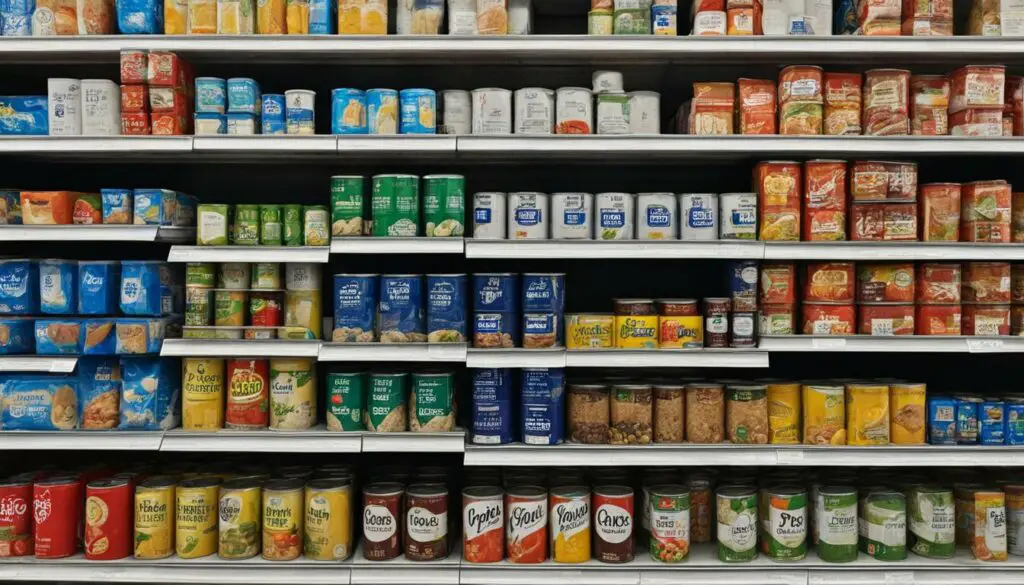Originally posted on December 24, 2023 @ 3:15 am
Have you ever wondered if grocery stores can legally sell expired food? The topic of expired food in grocery stores raises questions about the legality of selling such products, the consequences of doing so, and the regulations surrounding expired food. In this article, we will explore these aspects and provide you with the facts you need to know.
Table of Contents
Key Takeaways:
- Grocery stores can sell or donate food past the date on the label, except for infant formula and baby food.
- Expired food does not necessarily mean unsafe food, as long as it was handled and stored appropriately.
- California has specific regulations on food product dating, including requirements for infant formula and baby food.
- Consumer confusion about date labels contributes to food waste, and education is crucial to understanding the difference between quality and safety indications.
- If you accidentally purchase expired food, you may be able to return it to the store for a refund or exchange.
Food Product Dating Regulations in California

When it comes to food product dating, California has specific regulations in place to protect consumers and ensure the quality and safety of certain products. Understanding these regulations can help both retailers and consumers make informed decisions regarding the purchase and handling of food items.
Under the California Retail Food Code, product dates are required for infant formula and baby food. These dates serve as an important indicator of nutrient quantity and quality, helping parents provide the best possible nutrition for their children. Retailers are mandated to check and ensure the accuracy of these date labels before selling or donating any infant formula or baby food products.
On the topic of food donation, the Good Samaritan Food Donation Act in California provides liability protection for donated food items that remain fit for consumption but exceed the labeled shelf life date. This legislation encourages individuals and businesses to donate food without the fear of legal liability, as long as the donated food is still safe to eat.
It is important for retailers and consumers alike to familiarize themselves with these regulations to ensure compliance and promote food safety. By adhering to California’s food product dating regulations and understanding liability protection for food donations, we can all play a role in minimizing food waste and ensuring the well-being of our communities.
Consumer Awareness of Food Product Dates

Confusion about food expiration dates can lead to significant consumer waste. Surprisingly, approximately 84% of Americans occasionally discard food close to or past the date on the package.
This confusion surrounding date labels contributes to an estimated 20% of consumer waste, resulting in a staggering $29 billion wasted annually. This waste is not only detrimental to the environment but also impacts consumers’ budgets.
It is vital to educate consumers that the dates on food products primarily indicate quality rather than safety. By understanding this distinction, individuals can make informed decisions about whether to consume or discard food items.
Can Stores Legally Sell Expired Food?
When it comes to the sale of expired food, the legality of the matter can vary depending on federal and state regulations. While the federal government does not mandate expiration labels on food products, there are exceptions in place to protect certain vulnerable populations.
Under federal regulations, baby food and formula must have expiration labels to ensure the safety and quality of these products. This is because the nutritional value of these items can degrade over time, posing potential risks to infants and young children.
On the state level, regulations regarding the sale of expired food can differ. State governments have the authority to create their own guidelines and requirements for food product dating, including the labeling and sale of items past their expiration dates.
Moreover, past lawsuits against retailers have shed light on the importance of complying with regulations and ensuring the sale of safe and fresh food. Major retailers have faced class action lawsuits in the past for selling expired food, emphasizing the need for vigilance and adherence to expiration date guidelines.
Overall, while there is no federal mandate for expiration labels on most food products, exceptions exist for baby food and formula. State regulations play a crucial role in determining the legality of selling expired food, and past lawsuits serve as a reminder of the consequences that retailers may face for non-compliance.
Stay informed about your rights as a consumer and the regulations in your state to ensure that the food you purchase meets safety standards.
Purpose of Food Expiration Dates

Food expiration dates serve an important purpose in the consumer journey, providing helpful information for freshness estimation and ensuring safety determination. However, it’s essential to understand that these dates are not definitive indicators of whether food items are safe to consume. Instead, they primarily serve as estimates of product freshness.
Highlighted Keywords: freshness estimation, safety determination, consumer discretion, avoiding expired food.
Expiration dates on food products are primarily intended to inform consumers about the estimated timeframe within which the food is expected to maintain optimal quality. They serve as a general guideline for retailers to determine product rotation and consumer discretion in choosing the freshest items. However, it’s crucial to recognize that the label itself does not provide a guarantee of safety.
Consumers should exercise caution and use their discretion when handling and consuming expired food products. While some items may still be safe to eat after the indicated expiration date, it’s important to pay attention to signs of spoilage or degradation, such as unusual odors, texture changes, or mold growth. Trusting one’s senses and using common sense is key to avoiding the consumption of potentially harmful expired foods.
It’s worth noting that certain food products, such as perishable items like meat, poultry, and seafood, may pose a higher risk if consumed past their expiration dates. These items require additional attention and should be handled according to specific food safety guidelines.
Consumer Discretion and Avoiding Expired Food
To avoid consuming expired food products:
- Check expiration dates before purchasing:
- Inspect the product packaging for clear expiration date labels.
- Choose items with later expiration dates to maximize freshness.
- Follow recommended storage instructions on the packaging.
- Ensure refrigerated items are stored at appropriate temperatures.
- Use proper food storage containers to maintain freshness.
- Look for visible signs of spoilage, such as mold, discoloration, or unusual odors.
- Check for texture changes or unusual consistency.
- If a food item appears questionable, trust your instincts and err on the side of caution.
- If in doubt, discard the item to prioritize safety.
By exercising consumer discretion and taking proper precautions, it is possible to minimize the risk associated with consuming expired food products. However, it is important to remember that the ultimate responsibility lies with the consumer to make informed decisions about food safety.
Dealing with Expired Products

If you accidentally purchase an expired food item, there are several steps you can take to address the situation and potentially seek redress. Here’s what you can do:
1. Returning expired items
Consider returning the expired food item to the store where you made the purchase. Many stores have policies that allow customers to return or exchange expired products. Make sure to bring your receipt as proof of purchase.
2. Store refunds and exchanges
If the store refuses to reimburse you or offer an exchange despite your proof of purchase, escalate the issue by speaking with the store manager. Explain the situation and politely request a refund or exchange.
3. Contacting store management
If the store manager fails to provide a satisfactory resolution, you can go a step further and contact the corporate office of the store. Explain the issue and provide all relevant details. They may be able to assist you or provide further guidance.
4. Filing complaints
If you believe the store is consistently selling expired food items, and it has caused you or others to become ill, consider filing complaints with relevant regulatory agencies such as the Better Business Bureau, the U.S. Food and Drug Administration (FDA), and your state’s attorney general office. Your complaints can help draw attention to the issue and prompt necessary actions.
5. Contacting the manufacturer
In certain cases, it may be beneficial to reach out to the manufacturer of the expired food item. Provide them with details about the product, including the expiration date and any potential health consequences you experienced. Manufacturers may offer compensation or take steps to prevent similar incidents in the future.
Remember, taking action against the sale of expired food not only protects your rights as a consumer but also helps ensure the safety and quality of products in the market.
Potential Health Risks of Consuming Expired Food

Consuming expired food products can potentially lead to foodborne illnesses. When food reaches its expiration date, it may become contaminated with harmful bacteria or toxins, increasing the risk of illness upon consumption. Common symptoms of foodborne illnesses include nausea, vomiting, diarrhea, abdominal pain, and fever.
In cases where expired food causes illness, manufacturers and distributors may be held responsible for the resulting harm. Product liability laws establish that manufacturers and distributors have a duty to ensure the safety and quality of the products they sell. This includes ensuring that food items are not sold past their expiration dates.
However, proving causation between consuming expired food and the resulting illness can be challenging. To successfully hold manufacturers and distributors accountable, it is crucial to establish a clear link between the consumption of the expired food and the specific illness experienced. This typically requires medical evidence, such as lab test results, to demonstrate that the illness was directly caused by the consumption of the expired food.
Product liability cases related to expired food involve complex legal considerations. It is recommended to consult with an experienced personal injury attorney who specializes in product liability to navigate the legal process effectively.
Quotes:
“Consuming expired food can be risky, as it may contain harmful bacteria or toxins that can lead to foodborne illnesses.” – Dr. Emily Johnson, Food Safety Expert
Common Types of Foodborne Illnesses
| Foodborne Illness | Symptoms | Common Contaminants |
|---|---|---|
| Salmonella | Nausea, vomiting, diarrhea, abdominal pain, fever | Raw or undercooked poultry, eggs, and unpasteurized dairy products |
| E. coli | Severe abdominal pain, bloody diarrhea, vomiting | Contaminated ground beef, raw milk, raw fruits and vegetables |
| Listeria | Fever, muscle aches, nausea, diarrhea | Contaminated deli meats, unpasteurized dairy products, refrigerated smoked seafood |
It is important to note that each foodborne illness may have additional symptoms and can lead to severe complications, particularly among vulnerable populations such as young children, pregnant women, and elderly individuals. Prompt medical attention should be sought if symptoms of foodborne illness occur after consuming expired or contaminated food.
Burden of Proof in Expired Food Lawsuits
When filing a lawsuit related to expired food, the outcome heavily relies on the extent of the injuries suffered by the consumer. In order to win the case, it is crucial to provide proof of causation between the consumption of the expired food and the resulting illness or harm.
“The burden of proof lies on the plaintiff to establish that the expired food was directly responsible for the injuries sustained. This requires concrete evidence linking the consumption of the expired food to the specific health issues experienced.”
Minor illnesses that can be easily treated or do not have a significant impact on the consumer’s health may not be sufficient grounds for a successful lawsuit. However, if the expired food causes major side effects that result in severe illness or long-term health complications, which negatively impact the consumer’s financial health, the case may warrant legal action.
Proof of Causation
Establishing a direct link between the consumption of expired food and the resulting illness requires solid evidence. This can include medical records, documentation of symptoms happening shortly after consuming the expired food, and expert testimony from medical professionals.
It’s important to consult with a personal injury lawyer who specializes in product liability lawsuits. These attorneys have the experience and expertise necessary to analyze the circumstances, gather the required evidence, and build a strong case for their clients.
Impact on Financial Health
Expenses incurred from medical treatment, hospitalization, and ongoing care for illnesses caused by expired food can have a significant impact on an individual’s financial health. In some cases, the costs may be substantial and long-lasting, affecting an individual’s ability to work and their overall financial stability.
A successful lawsuit can help recovering damages for medical expenses, lost wages, pain, suffering, and other related losses. It is important to consult with a personal injury lawyer to understand the potential legal options available and to seek appropriate compensation.
In conclusion, the success of an expired food lawsuit hinges on providing evidence of the extent of injuries and proving the causation between the consumption of the expired food and the resulting illness. With the guidance of a personal injury lawyer, individuals can pursue legal action to recover damages and alleviate the financial burden caused by consuming expired food.
Contacting an Experienced Attorney
If you have suffered injuries caused by expired food, it is crucial to engage with an experienced attorney who can help you navigate the legal process and pursue compensation for your damages. When contacting an attorney, providing proof of your injuries is essential in building a strong case.
The viability of your legal action depends on the severity of your illness. While minor illnesses may not be sufficient grounds for a lawsuit, major illnesses that have a significant impact on your health and finances can warrant legal action.
Skilled personal injury lawyers specializing in food safety laws can guide you through the complexities of local regulations. They have the knowledge and expertise to investigate the circumstances surrounding your case and assist you in recovering damages for serious food poisoning or illness caused by expired products.
Receiving proper compensation for your injuries can help alleviate some of the financial burdens you may face due to medical expenses, lost wages, and other related costs. An attorney will work diligently to ensure your rights are protected and that you receive the compensation you deserve.
Taking Action Against the Sale of Expired Food
As a consumer, you have certain rights when it comes to the purchase of food products, including the sale of expired items. Here are some steps you can take to protect yourself and seek appropriate recourse:
1. Returning Expired Food
If you discover that you have purchased expired food, don’t hesitate to return it to the store where you made the purchase. Most retailers have a policy in place that allows customers to return or exchange expired items. Keep your receipt as proof of purchase and ensure that the product is in its original packaging.
2. Seeking Refunds or Exchanges
When returning expired food, inquire about the store’s refund or exchange policy. In many cases, you may be entitled to a full refund or the option to exchange the expired item for a similar product. By exercising your consumer rights, you can protect yourself from financial losses.
3. Reporting to Regulatory Agencies
If you come across a store consistently selling expired food, it’s important to report this to the appropriate regulatory agencies. The Food and Drug Administration (FDA) and the Better Business Bureau (BBB) are examples of organizations that handle consumer complaints related to the sale of expired products. By reporting such incidents, you contribute to safeguarding the well-being of other consumers.
4. Legal Recourse
If consuming expired food causes illness or harm, you may have grounds for legal recourse. Consult with a personal injury lawyer who specializes in product liability cases to determine the viability of a legal claim. They can help you assess the extent of the harm, gather evidence, and navigate the legal process to seek compensation for damages.
Remember, your consumer rights include the ability to return expired food, seek refunds, report to regulatory agencies, and pursue legal recourse when necessary. By taking appropriate action, you not only protect yourself but also contribute to upholding food safety standards and accountability in the marketplace.
Conclusion
In conclusion, grocery stores have the legal ability to sell expired food, but there are certain exceptions and guidelines in place. It is crucial for consumers to exercise caution and understand the distinction between date labels that indicate quality and those that indicate safety. While some expired food items may still be safe to consume, it is important to handle and store food properly and follow safe cooking practices.
If individuals experience illness as a result of consuming expired food, they may have legal options to pursue compensation. However, the outcome of such cases depends on the extent of the injuries and the ability to establish a causal link. Seeking the guidance of an experienced attorney can help navigate the legal process and explore potential avenues for redress.
Overall, while grocery stores can sell expired food within certain parameters, maintaining proper food safety practices and consumer awareness is essential for personal well-being. By understanding the regulations and taking appropriate actions, individuals can make informed choices and help ensure their own safety.
FAQ
Can grocery stores sell expired food?
Grocery stores are generally allowed to sell or donate food past the date label, except for infant formula and baby food. The quality of the products may deteriorate, but they should still be wholesome.
What are the regulations regarding food product dating in California?
California state law requires product dates on infant formula and baby food to ensure nutrient quantity and quality. The California Retail Food Code mandates these date labels and requires checking them before sale or donation.
Why is there confusion about food product dates?
Confusion about the meaning of date labels contributes to consumer waste. Approximately 84% of Americans occasionally throw away food close to or past the date on the package. Date label confusion is estimated to account for 20% of consumer waste, resulting in $29 billion wasted annually.
Can stores legally sell expired food?
Stores can legally sell expired food with certain exceptions and guidelines. The federal government does not require expiration labels on food products, except for baby food and formula. State governments have the authority to create their own regulations. In the past, states have sued major retailers for selling expired food, leading to class action lawsuits.
What is the purpose of food expiration dates?
The expiration date on food products is an estimate of freshness. However, the label does not determine the safety of the food items. Some expired food items may still be safe to eat, but consumer discretion is advised.
What should I do if I accidentally purchase an expired food item?
If you accidentally purchase an expired food item, consider returning it to the store for a refund or exchange. Contact the store manager and corporate office if they refuse reimbursement despite proof of purchase.
What can I do if the store sells expired food, and it causes illness?
If the store sells expired food, and it causes illness, you can file complaints with the Better Business Bureau, FDA, and state attorney general. Seeking legal action may be an option to pursue compensation for damages.
Are there potential health risks associated with consuming expired food?
Consumption of expired food products can potentially cause foodborne illnesses. Manufacturers and distributors may be held responsible for faulty products, including expired food that leads to illness.
What is the burden of proof in expired food lawsuits?
Proving causation between the expired food and resulting illness is crucial in product liability cases. The outcome of an expired food lawsuit depends on the extent of the injuries linked to the consumption. Minor illnesses may not be sufficient grounds for a lawsuit, but major side effects that negatively impact financial health can warrant legal action.
How can I contact an experienced attorney for help with expired food cases?
Engaging with an experienced attorney requires providing proof of injuries caused by expired food. Skilled personal injury lawyers can help navigate local food safety laws and pursue compensation for serious food poisoning or illness from expired products.
What actions can I take against the sale of expired food?
Consumer rights include returning expired food and seeking refunds or exchanges. Reporting the sale of expired food to regulatory agencies such as the FDA and Better Business Bureau can help take appropriate action. Legal recourse may be available if the sale of expired food causes illness or other significant harm.
Source Links
- https://rasmussenandminer.com/can-you-sue-a-store-for-selling-expired-food/
- https://pw.lacounty.gov/epd/sbr/pdfs/FAQ-FoodProductDating.pdf
- https://www.bakersfield.com/news/ask-the-californian-why-can-grocers-sell-expired-food/article_d9743431-dd5d-5829-b716-37179f1e801d.html
See also:
Leave a Reply